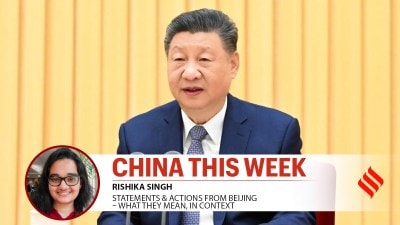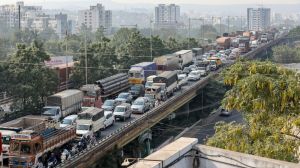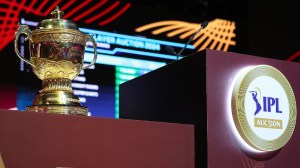Former ambassador Navdeep Suri: ‘UAE is our third largest trading partner; there are huge economic stakes in ties with it’
Former ambassador Navdeep Suri analyses how the damage to India's image in GCC countries will take long-term public diplomacy to repair.
 Former ambassador Navdeep Suri.
Former ambassador Navdeep Suri.In this edition of explained.Live, former ambassador Navdeep Suri analyses how the damage to India’s image in GCC countries will take long-term public diplomacy to repair. The session was moderated by Deputy Chief of National Bureau Shubhajit Roy.
On the significance of the relationship between India and West Asia
Many people in India don’t understand how important the relationship with West Asia, in particular the larger arc of Gulf countries, is from an Indian perspective. The first dimension of this relationship is historical. If we go back a hundred years, the only point of reference for people here was Bombay, which they came to for trade, education, healthcare and tourism much before they discovered London, Paris and New York with the oil boom. We need to reclaim that space, which we lost for some decades after our independence in 1947. The trauma of Partition blinded us to the reality that we had traditionally been a maritime nation. Around 25 years ago, the Government started the Look East Policy, by which we improved our relationship with Southeast Asia and now we have the Look West policy to reclaim our relationship with the Gulf countries.
Our trade ties anchor this relationship. While the US is our number one trading partner, China is number two and the UAE is number three. During the 2021-2022 financial year, trade was $72 billion. Our trade with the GCC countries — Saudi Arabia, Bahrain, Qatar, Oman, UAE and Kuwait — is larger than our trade with the European Union. Last year, our exports to UAE alone were about $32 billion, which is our second-largest destination of exports after the US. So there are huge economic stakes in the relationship. The large sovereign funds like PIF in Saudi Arabia, the Qatar Investment Authority in Doha and the Abu Dhabi Investment Authority are investing billions of dollars in the Indian economy and this is the kind of patient, long-term capital that the Indian economy needs.
The Abu Dhabi Investment Authority is the world’s second-largest sovereign wealth fund with assets of almost $900 billion and they’ve put money into our national infrastructure fund. They’ve invested hundreds of millions of dollars into renewable energy, highways, logistics and a range of new sectors.
Nearly 60 per cent of India’s imports from GCC countries are crude and natural gas. In the longer term, oil from the Gulf will always be more economically viable than the temporary situation with Russian oil. Therefore, our energy security is critically dependent on Gulf countries.
Close to 80 lakh Indians call one or another country in the Gulf their home. Unlike, the Indian diaspora in the US, Canada or elsewhere, virtually all of these are Indian passport holders, placed at top-end groups like Lulu and Landmark. They are now investing in India. According to the Word Bank, our total remittances globally last year were about $84-85 billion, two-thirds from the Gulf.
From a strategic and military perspective, the sea lanes of communication in the Red Sea or the Gulf are crucial for us. Our ships can go that much further by refuelling and getting other facilities at Duqm in Oman, which then becomes a crucial strategic partner for the Indian Navy. Our intelligence cooperation has helped us break terrorist networks like those of Dawood Ibrahim and bring back gangsters like Farooq Takla.
On the changing relationship since 2014
I was ambassador to Egypt when Prime Minister Narendra Modi was elected. Their leadership had then thought that his government would affect India’s relationship with the Muslim world. Eight years later, except this recent blip (the Nupur Sharma incident), India’s relationship with the Muslim world, broadly speaking, has never been better. The Modi government has invested enormous energy into the relationship. No Indian Prime Minister visited the UAE for 34 long years after Indira Gandhi in 1981 till Modi did so in August 2015. Modi’s recent visit to Abu Dhabi was his fourth. Usually in diplomacy, relationships change incrementally but you can see the transformation this engagement has brought about in our ties. The Gulf was thought to be Pakistan’s strategic backyard because it is an Islamic republic. That was true for a long time but changed ever since UAE moved to a greater religious tolerance with now a ministry dedicated to it. Saudi Arabia has made immense strides in changing its attitude towards terrorism. The posturing has changed dramatically after 9/11 when they started seeing Pakistan as the problem and India as a secular, stable country that they would want to invest in. You have seen the transformation to a point that when Article 370 was revoked, none of the Gulf countries spoke against us. The UAE, in fact, went out to say it is India’s internal matter. When the UAE was hosting the foreign ministers of the Organisation of Islamic Countries (OIC), they invited Sushma Swaraj, who was not just India’s foreign minister then but a Hindu woman, as the chief guest of honour. I wish people understood how much distance we have travelled in such a short span of time.
On Pakistan and terrorism
When 9/11 happened, it came as a shock to the UAE and Saudi Arabia. Among the 19 hijackers, 15 were Saudi and three were Emiratis. They realised the influence of not just the Muslim Brotherhood through educational institutions but also the reach of radical groups like Al-Qaeda through social media. They decided that this was an existential threat and today there is zero tolerance for anyone supporting terrorism. They took major steps to translate that intent into reality and in the process, Pakistan became a part of the problem as a country which is host to so many terrorist groups. The Emiratis haven’t forgotten or forgiven the fact that their ambassador to Afghanistan was blown up in Kandahar and there was a lingering suspicion that the trigger was pulled from across the border in Pakistan.
On the diplomatic side of Gulf relations
We should never put ourselves in the situation of either-or. We should have relationships with whoever works with our national interests. Even at the worst of times, over the last two decades, we’ve talked to the Israelis, Palestinians, Saudis, Iranians and Qataris, even when they were at loggerheads with the Emiratis.
There is no contradiction between the fact that we have excellent relations with Saudi Arabia and Iran, even though the two may not necessarily talk to each other.
On the impact of Nupur Sharma’s remarks
The remarks were odious and in the nature of a self-goal. It’s very disheartening that such remarks come from members of the ruling party when the PM himself has invested so much in developing the relationships. It’s almost like saying that the right hand doesn’t know what the left one is doing. Beyond that, isn’t it part of our culture to respect other religions? Similar comments were made in France, Netherlands and Denmark. Our notion of secularism is different from the French notion of secularism and it’s worth looking at that separately. If on a single day, three Indian ambassadors are being summoned, rebuked and handed out a protest note, it is a big deal. For it to happen in Qatar, on the day our Vice-President was in that country, is a major embarrassment. This was not a diplomatic failure, it was a political failure. We must do damage control.
I believe that Government-to-Government (G2G) relations are resilient as there are deep national interests involved. The damage to G2G relations is transient but the damage to the image of India in these countries is deeper and it will take an extensive long-term public diplomacy effort to put the clock back where it was. The image hit is palpable in the Arab media with questions like, “Is the new India disrespectful to other religions?” The extreme Right-wing trolling has not helped either.
I saw the Twitter feed of the assistant foreign minister of Qatar, who had simply retweeted her foreign office statement. But the abuse was uncalled for. I’m also aware that some of this is amplified by Pakistanis, bots and other people with a vested interest in embarrassing us. But there’s no dearth of our own people putting out some really obnoxious comments on social media without realising that they are harming India’s interests. It will take time to undo this because we have shown an ugly side of India that perhaps was previously hidden.
Audience Questions
On which country is more dependent on the other
I don’t think we should put it in quite that formulation. Today, if we want gas, I don’t think we have a lot of options if Qataris want to replace Indians. There are a dozer other nationalities that could come in and replace Indians. There are interdependencies. The interests run deep on both sides. No diplomat would want to fall into the binary that you are trying to propose, which will run completely counter to our interests in the region.
On countering China’s influence
In the last 10 years, China has made vast inroads into the Gulf, and it has done that on at least three levels, if not more, taking advantage of US disinterest. The first is major investments in infrastructure projects, some through the Belt-and-Road initiative, some through state-owned enterprises in key areas. The second is trade, India having been supplanted by China as the largest trading partner in the UAE. The third is the transfer of strategic military technologies in the Gulf.
- 01
- 02
- 03
- 04
- 05






































